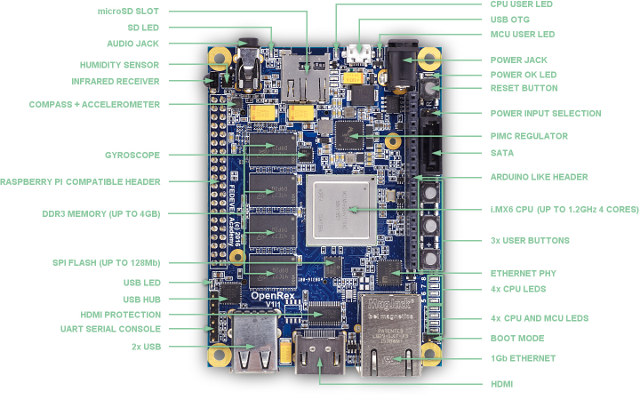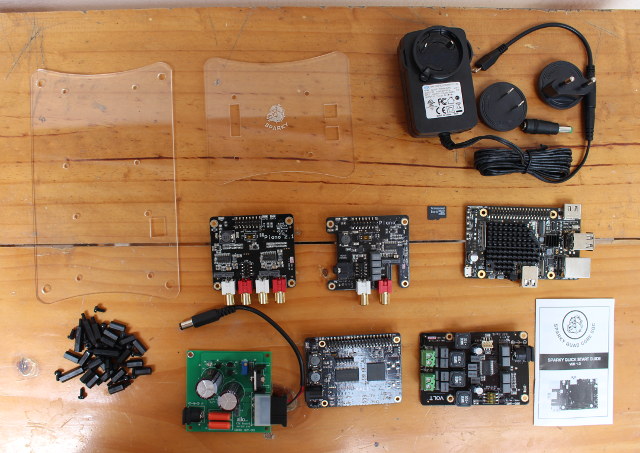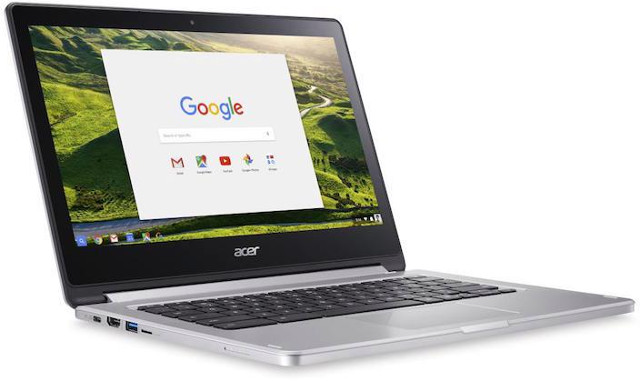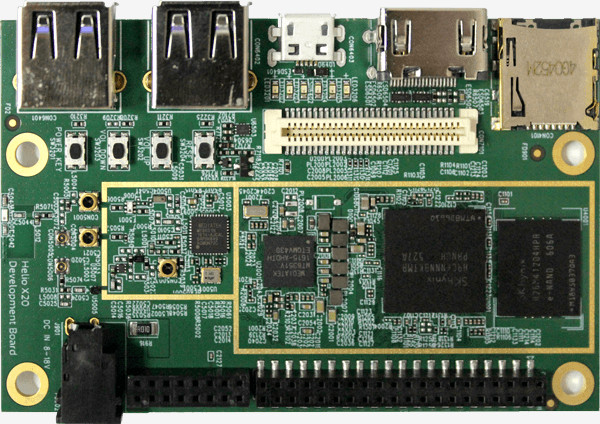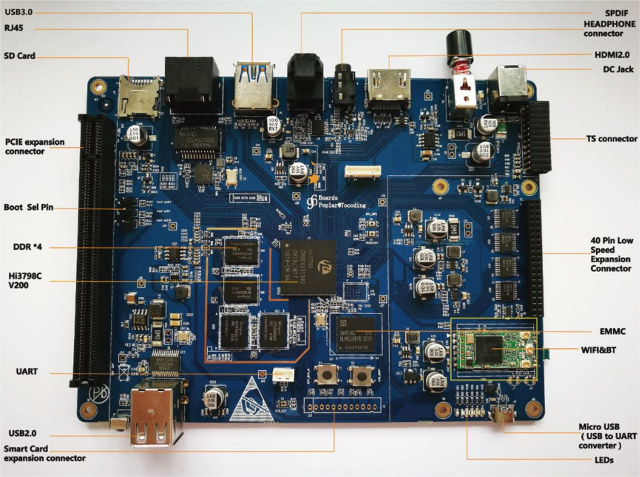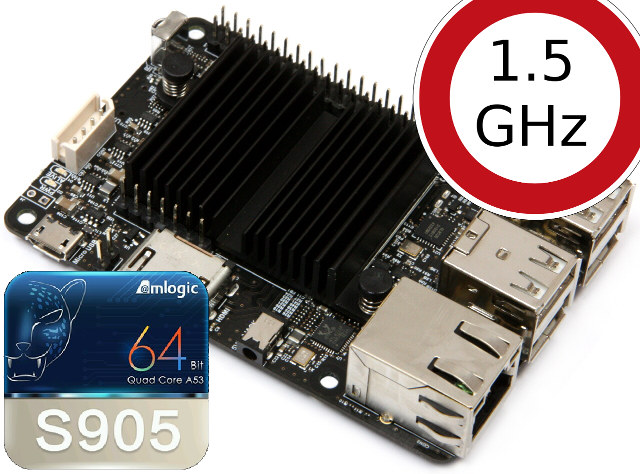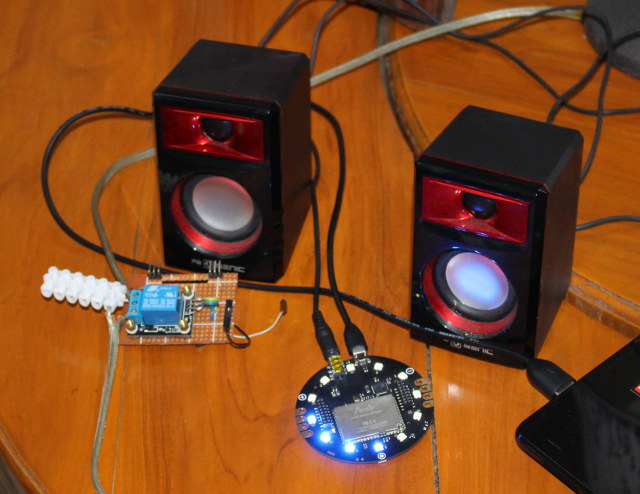OpenRex is an open source hardware board powered by NXP i.MX6 Cortex A9 processor designed by Fedevel for their hardware design course, and manufactured by Voipac, both companies based on Slovakia. The schematics, PCB layout, gerber files and other manufacturing files were released in February, but the company has only started selling the board a few days ago with OpenRex Basic SBC and OpenRex Max SBC boards. OpenRex Basic and Max boards specifications: SoC OpenRex Basic – NXP i.MX 6Solo single core Cortex A9 processor @ 1 GHz with 2D and 3D GPU OpenRex Max – NXP i.MX 6Quad quad core Cortex A9 processor @ 1 GHz with 2D and 3D GPU MCU – NXP LPC1345FHN33 ARM Cortex-M3 micro-controller @ 72 MHz System Memory Basic – 512 MB DDR3-1066 (400MHz) Max – 2GB DDR3-1066 (533 MHz) Storage Basic – micro SD slot, 1x 2Kbit I2C EEPROM, 1x 32Mbit SPI flash Max […]
Allo Sparky Audio Kit Combines an ARM Linux Board with Amplifier, Audio DAC, Reclocker and Capacitance Multiplier Boards
Last year I wrote about Allo Sparky SBC Linux and Android development powered by Actions Semi S500 quad core Cortex A9 processor, which mostly differentiates itself from the competition by the many add-on boards for audio, VoIP, and IoT (WiFi+Bluetooth+Zigbee ). While most of development boards are manufactured in China, Allo company is based in India, and all boards are manufactured there, which could be a benefit to Indian readers who want to avoid potential custom issues with other boards. The company has shipped me their complete audio development kit, and I’ll first check out the hardware, before taking time to experiment with the kit in a few weeks or months… I could find 6 different boards in the kit, which I detailed below, as well as a 5V/3A power supply with AU and EU adapter, a micro USB adapter, a micro SD card apparently pre-loaded with Ubuntu 12.04, a […]
Acer Chromebook R13 is Powered by Mediatek MT8173 64-bit ARM Processor
The just announced Acer Chromebook R13 is both the first Mediatek Chromebook and the first 64-bit ARM Chromebook thanks to its Mediatek MT8173(c) quad core processor with two ARM Cortex-A72 cores, and two ARM Cortex-A53 cores. The Chromebook is also fitted with a 13.3″ touchscreen display, 4 GB RAM, and up to 64GB internal storage. Acer Chromebook R13 specifications: SoC – Mediatek M8173C quad core processor with 2x ARM Cortex A72 cores, 2x ARM Cortex A53 cores, and a PowerVR GX6250 GPU System Memory – 4GB LPDDR3 RAM Storage – 16, 32 or 64 GB eMMC flash Display – 13.3″ touchscreen IPS display; 1920×1080 resolution; 10-point touch; 360-degree hinge design Audio – Integrated microphone, dual built-in speakers, microphone and headphone jacks Video Output – HDMI Camera – HD webcam (1280×720 resolution) with HDR and 720p HD audio/video recording Wireless Connectivity – 2×2 MIMO 802.11ac WiFi and Bluetooth 4.0 USB – […]
96Boards Compliant Mediatek X20 Development Board is Now up for Sale for $199
Mediatek Labs and Linaro introduced X20 development board based on 96Boards CE specs, and featuring Mediatek Helio X20 deca-core Cortex A72/A53 processor a couple of months ago. At the time, if you wanted to purchase the board, you’d have to fill a form explaining the details about your project, and the company, Alpha Star, would then decided whether would sell it to you. The good news here is that you don’t need to do any of that anymore, and you can buy the board directly on Seeed Studio for $199, or on Taobao for 1399 RMB. Mediatek X20 development board specifications have not changed much since the first announcement, but the CPU and GPU frequencies have been lowered somewhat, and we have some more details: SoC – Mediatek Helio X20 (MT6797) deca-core processor with two ARM Cortex A72 cores @ 2.1~2.3 GHz, four Cortex A53 @ 1.85 GHz, four Cortex […]
$79 HiSilicon Poplar is the First 96Boards TV Platform Compliant Board
At the end of last month I wrote about 96Boards TV Platform specifications, and noticed Hisilicon had one such boards, but details were sparse. Linaro has now officially unveiled HiSilicon Poplar board, the first 96Boards TV Platform board, sold for $79 + shipping on Aliexpress. Poplar board specifications: SoC – HiSilicon Hi3798C V200 quad-core 64-bit ARM Cortex-A53 CPU up to 2.0 GHz per core with ARM Mali-T720 GPU supporting OpenGL ES 3.1/3.0/2.0/1.1/1.0, OpenVG 1.1, OpenCL 1.2/1.1 Full Profile, RenderScript, and Microsoft DirectX 11 FL9_3 Memory – 1 or 2 GB DDR3 (Specs are conflicting depending where you look) Storage – 8GB eMMC flash + micro SD card slot Video Output – HDMI 2.0a with HDCP 2.2 up to 4K @ 60Hz Video Decoding – H.265/HEVC Main/Main10 and VP9 up to 4K @ 60 fps Audio Output – HDMI, optical S/PDIF, 3.5mm audio jack Connectivity – Gigabit Ethernet, 802.11 b/g/n/ac WiFi […]
C.H.I.P Board and Allwinner A13/R8 SoCs To Get VPU Support in Linux Mainline
Allwinner has mixed relationships with open source communities such as Kodi, especially due to issues with its closed-source CedarX VPU drivers, and some GPL violations. However to address the former, linux-sunxi community has been working on open source Cedrus library for the video processor unit on Allwinner processors, that’s been successfully tested on boards such as Orange Pi One. Free Electrons has gone further, as they’ve made sure Cedrus now works with Linux mainline kernel, currently Linux 4.8, and tested it on Allwinner R8 based Pocket CHIP. The work has been done by Florent Revest, a 19 years old intern at the company, who delivered a new sunxi-cedrus driver, a Video4Linux (V4L2) memory-to-memory decoder kernel driver, and corresponding VA-API backend, with the implementations currently available on Github here and there respectively. Currently only MPEG2 and MPEG4 are working, but adding other codecs such as H.264, and video encoding is possible […]
Amlogic S905, S905X, and S912 Processors Appear to be Limited to 1.5 GHz, not 2 GHz as Advertised
When I compared the performance Amlogic S905 and Rockchip RK3368 processors last year, I noticed Amlogic S905 single thread performance not being much faster than the one of Rockchip RK3368, despite the former allegedly clocked at 2.0 GHz against the latter 1.2 GHz. But early this month one member (koschi) on ODROID forums started a thread entitled “No performance difference between 1.5, 1.75 & 2GHz” about ODROID-C2 board. The first post link to Ant-computing website about choosing a processor for a build farm, and one of the tables comparing various ARM and x86 processors with the claim that Amlogic S905 was listed to 1.536 GHz, because “the device claims to run at 2.016 GHz but the kernel silently ignores frequencies above 1.536 GHz!” So koschi did his own tests with 7z and sysbench, using cpufreq-set -u $FREQ to set a fixed frequency between test, and could confirm the issue:
|
1 2 3 4 5 6 7 8 9 10 11 12 13 |
7z b, total MIPS kHZ MIPS 100000 221 250000 605 500000 1252 1000000 2488 1296000 3182 1536000 3705 1752000 3691 2016000 3682 avg. of 3 x sysbench --num-threads=4 --test=cpu run kHZ seconds @4threads seconds @1threads |
[…]
Getting Started with ReSpeaker WiFi IoT Board’s Audio Capabilities, Voice Recognition and Synthesis
ReSpeaker is a development board combining an Atmel AVR MCU, a MediaTek MT7688 WiFi module running OpenWrt, a built-in microphone, an audio jack, and I/O headers to allow for voice control and output for IoT applications. That means you could make your own Amazon Echo like device with the board and add-ons, use it as a voice controlled home automation gateway and more. The board was launched on Kickstarter a few days ago, and already raised $100,000 from about 100 backers, but I’ve received an early sample, so I’ll provide some more information about the firmware, and shows how to use with some Python scripts leveraging Microsoft Bing Speech API. You’ll need a micro USB to USB cable to connect your to computer (Linux, Windows, Mac OS…), and a speaker to connect to the board. Linux (OpenWrt) boots in a few seconds, and once it’s done all RGB LED will […]


